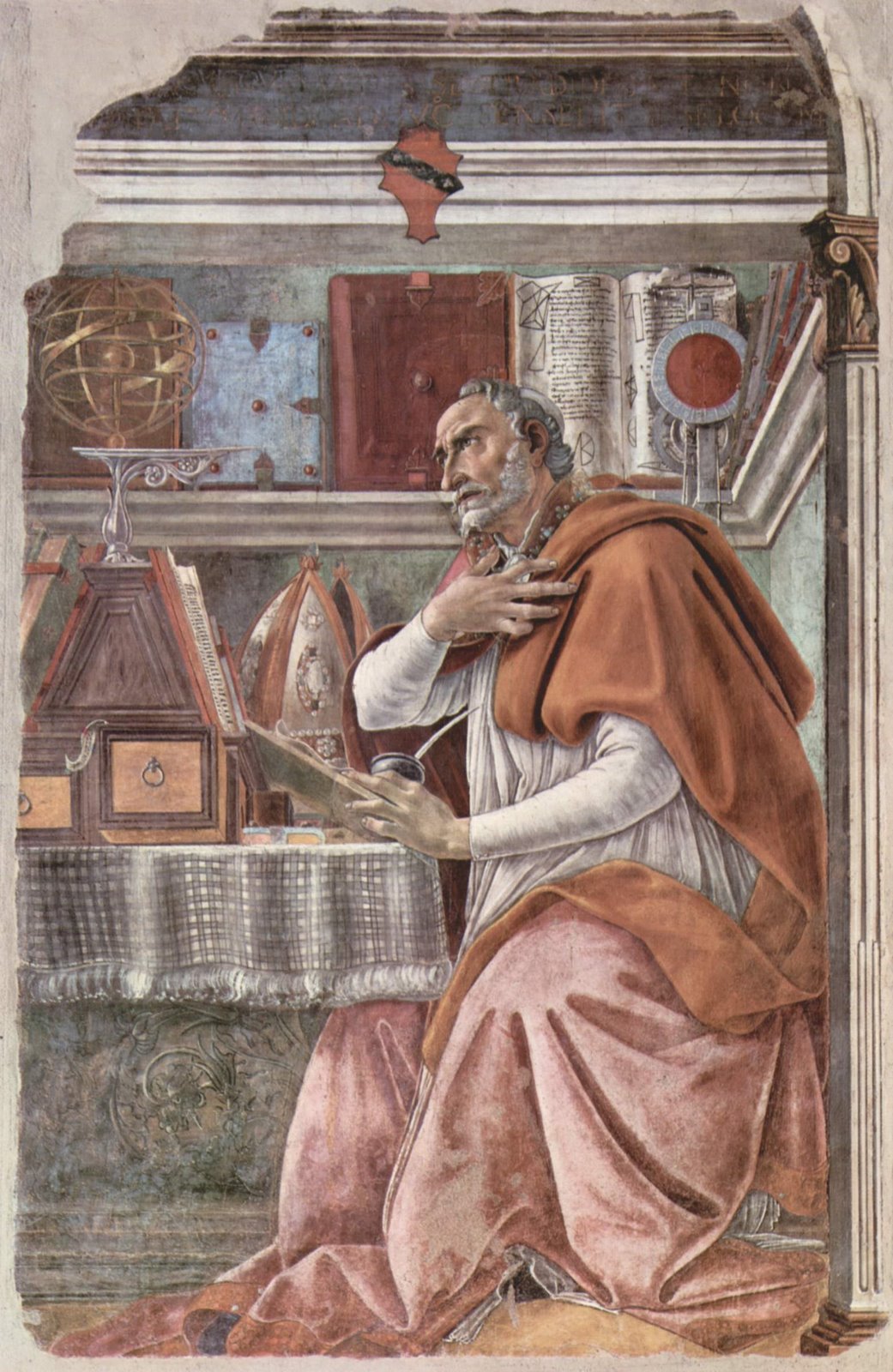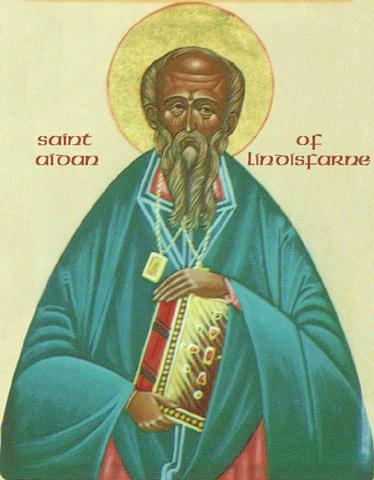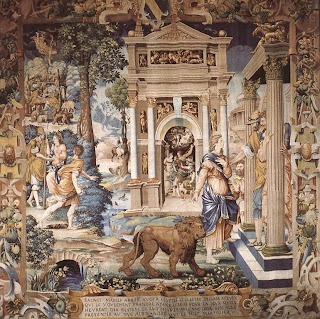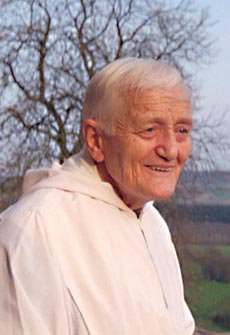
Aurelius Augustinus, Augustine of Hippo, or Saint Augustine (November 13, 354 – August 28, 430) was one of the most important figures in the development of Western Christianity, there considered to be one of the church fathers. He framed the concepts of original sin and just war.
In Roman Catholicism and the Anglican Communion, he is a saint and pre-eminent Doctor of the Church, and the patron of the Augustinian religious order. Many Protestants, especially Calvinists, consider him to be one of the theological fathers of Reformation teaching on salvation and grace. In the Eastern Orthodox Church he is a saint, and his feast day is celebrated annually on June 15, though a minority are of the opinion that he is a heretic, primarily because of his statements concerning what became known as the filioque clause. Among the Orthodox he is called Blessed Augustine, or St. Augustine the Blessed. "Blessed" here does not mean that he is less than a saint, but is a title bestowed upon him as a sign of respect. The Orthodox do not remember Augustine so much for his theological speculations as for his writings on spirituality.
Augustine was one of the greatest theologians of Western Christianity. (In his day the Mediterranean world consisted of an Eastern, Greek-speaking half and a Western, Latin-speaking half, with different ways of looking at things, and different habits of thought.) He was born 13 November 354 in North Africa, about 45 miles south of the Mediterranean, in the town of Tagaste in Numidia (now Souk-Ahras in Algeria), near ancient Carthage (modern Tunis). His mother, Monnica, was a Christian, and his father for many years a pagan (although he became a Christian before his death). His mother undertook to bring him up as a Christian, and on one level he always found something attractive about Christ, but in the short run he was more interested in the attractions of sex, fame, and pride in his own cleverness. After a moderate amount of running around as a teen-ager, he took a mistress, who bore him a son when he was about eighteen. Theirs was a long-term relationship, apparently with faithfulness on both sides, and the modern reader is left wondering why he did not simply marry the girl. He never tells us this (and in fact never tells us her name), so that we can only guess. It seems likely that she was a freedwoman, and the laws forbade marriage between a free-born Roman citizen and a slave, or an ex-slave.
He was from the beginning a brilliant student, with an eager intellectual curiousity, but he never mastered Greek -- he tells us that his first Greek teacher was a brutal man who constantly beat his students, and Augustine rebelled and vowed never to learn Greek. By the time he realized that he really needed to know Greek, it was too late; and although he acquired a smattering of the language, he was never really at home in it. However, his mastery of Latin was another matter. He became an expert both in the eloquent use of the language and in the use of clever arguments to make his points. He became a teacher of rhetoric in Carthage, but was dissatisfied. It was the custom for students to pay their fees to the professor on the last day of the term, and many students attended faithfully all term, and then did not pay. In his late twenties, Augustine decided to leave Africa and seek his fortune in Rome.
Augustine prospered in Rome, and was eventually appointed chief professor of rhetoric for the city of Milan, at that time the capital city of the Empire in the West. It should be noted that this was an extremely prestigious appointment. In classical times, when laws were often made and issues voted on by huge public assemblies, when even juries typically had several hundred members, and when a man's public influence, or even on occasion his life, depended on his ability to sway large audiences, rhetoric -- the art of manipulating an audience -- was a skill that few men thought they could afford to neglect. (Socrates was one of the few, and we know what happened to him!) The art, at first intensely practical, had by Augustine's day become a display form admired for its own sake. However, the admiration was there. Every lawyer, arguing a case, was expected to give an eloquent speech, full of classical allusions and standard rhetorical flourishes. And Augustine was at the top of the field.
In Milan Augustine met the bishop Ambrose, and was startled to find in him a reasonableness of mind and belief, a keenness of thought, and an integrity of character far in excess of what he had found elsewhere. For the first time, Augustine saw Christianity as a religion fit for a philosopher.
He continued to hear Bishop Ambrose. And finally, partly because Ambrose had answers for his questions, partly because he admired Ambrose personally, and chiefly (or so he believed) because God touched his heart, he was converted to Christianity in 386 and was baptised by Ambrose at Easter of 387. About 12 years later he wrote an account of his life up to a time shortly after his conversion, a book called the Confessions, a highly readable work available in English. Ostensibly an autobiography, it is more an outpouring of penitence and thanksgiving.
After his conversion, Augustine went back to his native Africa in 387, where he was ordained a priest in 391 and consecrated bishop of Hippo in 396. It was not his intention to become a priest. He was visiting the town of Hippo, was in church hearing a sermon, and the bishop, without warning, said, "This congregation is in need of more priests, and I believe that the ordination of Augustine would be to the glory of God." Willing hands dragged Augustine forward, and the bishop together with his council of priests laid hands on Augustine and ordained him to the priesthood. (The experience may have colored Augustine's perception of such questions as, "Does a man come to God because he has chosen to do so, or because God has chosen him, and drawn him to Himself?") A few years later, when the Bishop of Hippo died, Augustine was chosen to succeed him.
He was a diligent shepherd of his flock, but he also found time to write extensively. He was an admirer of Jerome, and wrote him a letter hoping to establish a friendship, but the letter went astray. (In those days there was no public post office, and if you wanted to send a letter to a friend in Athens, you entrusted it to someone you knew who was travelling to Athens, or at least in that general direction, with instructions to deliver it or pass it on to someone else who would oblige.) Jerome did not get the letter, and the contents became public knowledge before he heard of it. Augustine, in addition to saying how much he admired Jerome, had offered some criticisms of something Jerome had written. Jerome was furious, and came close to writing Augustine off altogether. However, Augustine wrote him a second letter, apologizing and explaining what had happened, and Jerome was mollified. They had a long and intellectually substantial correspondence.
Augustine died on August 28, 430 during the siege of Hippo by the Vandals. He is said to have encouraged its citizens to resist the attacks, primarily on the grounds that the Vandals adhered to the Arian heresy. It is also said that he died just as the Vandals were tearing down the city walls of Hippo.
After conquering the city, the Vandals destroyed all of it but Augustine's cathedral and library, which they left untouched. Tradition indicates that his body was later moved to Pavia, where they are said to remain to this day.
Augustine was one of the most prolific Latin authors, and the list of his works consists of more than a hundred separate titles. They include apologetic works against the heresies of the Arians, Donatists, Manichaeans and Pelagians, texts on Christian doctrine, notably De doctrina Christiana (On Christian Doctrine), exegetical works such as commentaries on Genesis, the Psalms and Paul's Letter to the Romans, many sermons and letters, and the Retractationes (Retractions), a review of his earlier works which he wrote near the end of his life. Apart from those, Augustine is probably best known for his Confessiones (Confessions), which is a personal account of his earlier life, and for De civitate Dei (The City of God, consisting of 22 books), which he wrote to restore the confidence of his fellow Christians, which was badly shaken by the sack of Rome by the Visigoths in 410.
Augustine remains a central figure, both within Christianity and in the history of Western thought, and is considered by modern historian Thomas Cahill to be the first medieval man and the last classical man. In both his philosophical and theological reasoning, he was greatly influenced by Stoicism, Platonism and Neo-platonism, particularly by the work of Plotinus, author of the Enneads, probably through the mediation of Porphyry and Victorinus (as Pierre Hadot has argued). His generally favorable view of Neoplatonic thought contributed to the "baptism" of Greek thought and its entrance into the Christian and subsequently the European intellectual tradition. His early and influential writing on the human will, a central topic in ethics, would become a focus for later philosophers such as Schopenhauer and Nietzsche. In addition, Augustine was influenced by the work of both Virgil (known for his teaching on language) and Cicero (known for his teaching on argument).
Augustine's concept of original sin was expounded in his works against the Pelagians. However, Eastern Orthodox theologians, while they believe all humans were damaged by the original sin of Adam and Eve, have key disputes with Augustine about this doctrine, and as such this is viewed as a key source of division between East and West. His writings helped formulate the theory of the just war. He also advocated the use of force against the Donatists, asking "Why ... should not the Church use force in compelling her lost sons to return, if the lost sons compelled others to their destruction?" (The Correction of the Donatists, 22–24). St. Thomas Aquinas took much from Augustine's theology while creating his own unique synthesis of Greek and Christian thought after the widespread rediscovery of the work of Aristotle. While Augustine's doctrine of divine predestination would never be wholly forgotten within the Roman Catholic Church, finding eloquent expression in the works of Bernard of Clairvaux, Reformation theologians such as Martin Luther and John Calvin would look back to him as the inspiration for their avowed capturing of the Biblical Gospel. Bishop John Fisher of Rochester, a chief opponent of Luther, articulated an Augustinian view of grace and salvation consistent with Church doctrine, thus encompassing both Augustine’s soteriology and his teaching on the authority of and obedience to the Catholic Church. Later, within the Roman Catholic Church, the writings of Cornelius Jansen, who claimed heavy influence from Augustine, would form the basis of the movement known as Jansenism; some Jansenists went into schism and formed their own church.
Augustine was canonized by popular acclaim, and later recognized as a Doctor of the Church in 1303 by Pope Boniface VIII. His feast day is August 28, the day on which he died. He is considered the patron saint of brewers, printers, theologians, sore eyes, and a number of cities and dioceses. The latter part of Augustine's Confessions consists of an extended meditation on the nature of time. Catholic theologians generally subscribe to Augustine's belief that God exists outside of time in the "eternal present"; that time only exists within the created universe because only in space is time discernible through motion and change. His meditations on the nature of time are closely linked to his consideration of the human ability of memory. Frances Yates in her 1966 study, The Art of Memory argues that a brief passage of the Confessions, X.8.12, in which Augustine writes of walking up a flight of stairs and entering the vast fields of memory clearly indicates that the ancient Romans were aware of how to use explicit spatial and architectural metaphors as a mnemonic technique for organizing large amounts of information. According to Leo Ruickbie, Augustine's arguments against magic, differentiating it from miracle, were crucial in the early Church's fight against paganism and became a central thesis in the later denunciation of witches and witchcraft.
Propers for Augustine of Hippo - Bishop, Father and Doctor of the Church and Theologian
The Collect.
O LORD God, who art the light of the minds that know thee, the life of the souls that Love thee, and the strength of the hearts that serve thee: Help us, after the example of thy servant Saint Augustine, so to know thee that we may truly love thee, so to love thee that we may fully serve thee, whom to serve is perfect freedom; through Jesus Christ our Lord. Amen.
The Epistle Hebrews 12:22-24, 28-29.
BUT ye are come unto mount Sion, and unto the city of living God, the heavenly Jerusalem, and to an innumerable company of angels, to the general assembly and church of the firstborn, which are written in heaven, and to God the Judge of all, and to the spirits of just men made perfect, and to Jesus the mediator of the new covenant, and to the blood of sprinkling, that speaketh better things than that of Abel. Wherefore we receiving a kingdom which cannot be moved, let us have grace, whereby we may serve God acceptably with reverence and godly fear: for our God is a consuming fire.
The Gospel St. John 17:1-8.
THESE words spake Jesus, and lifted up his eyes to heaven, and said,
Father, the hour is come; glorify thy Son, that thy Son also may glorify thee: as thou hast given him power over all flesh, that he should give eternal life to as many as thou hast given him. And this is life eternal, that they might know thee the only true God, and Jesus Christ, whom thou hast sent. I have glorified thee on the earth: I have finished the work which thou gavest me to do. And now, O Father, glorify thou me with thine own self with the glory which I had with thee before the world was. I have manifested thy name unto the men which thou gavest me out of the world: thine they were, and thou gavest them me; and they have kept thy word. Now they have known that all things whatsoever thou hast given me are of thee. For I have given unto them the words which thou gavest me; and they have received them, and have known surely that I came out from thee, and they have believed that thou didst send me.
References and Sources:
http://baptistbard.blogspot.com/2009/08/august-28-augustine-of-hippo-convert.html
http://elvis.rowan.edu/~kilroy/JEK/08/28.html
http://comfortablewords.blogspot.com/2009/08/st-augustine-of-hippo.html
http://en.wikipedia.org/wiki/Augustine_of_Hippo
http://weedon.blogspot.com/2009/08/commemoration-of-saint-augustine-of.html
http://www.commonprayer.org/calend/propers/august_h.cfm
http://02continuum.wordpress.com/2009/08/28/augustines-prayer-to-our-lady-of-mercy/
http://oldhundredth.blogspot.com/2009/08/august-28-saint-augustine-bishop.html
†






.jpg)



